- Home
- Robert Goddard
Panic Room Page 6
Panic Room Read online
Page 6
‘She could have come herself.’
Don smiled. ‘I think she’s reluctant to ask for help.’
Now Glasson also smiled, apparently at some irony he detected in what Don had said. ‘More likely, Mr Challenor, she fears I’ve reflected on letting her put me in touch with … the Fry woman … and that I’ve concluded I’m better off without her.’
‘The Fry woman?’
‘Hasn’t Blake told you about … Wynsum Fry?’
‘No. Who’s she?’
‘A local … fortune-teller. A witch, maybe?’ Glasson shook his head, as if in disbelief. ‘You don’t imagine … such people exist … in the twenty-first century … until you learn they do.’
‘Blake put you in touch with a fortune-teller?’
‘She really hasn’t told you?’
‘Hasn’t told me what?’
‘I’m surprised … she let you come here without …’ Glasson never finished the sentence. He frowned thoughtfully, then said, ‘Maybe she thought … I wouldn’t mention it. And maybe I wouldn’t have, but for …’ He stared into the middle distance again.
‘What are you trying to say, Mr Glasson?’ Don prompted.
Glasson smiled wanly. He pointed to a small silver-framed photograph standing on the glass-topped wicker table between them. ‘That picture’s faded rather … in the sun … but I like to have it out here … to look at when I want.’
Don sensed he was being invited to look at the picture as well. It showed two fair-haired girls in their early teens, similar enough in appearance to be sisters. They were smiling toothily at the camera. One was slightly taller and older-looking. The younger-looking one was more obviously attractive, with high-set cheekbones and large, immersive eyes.
‘Muriel’s on the left,’ said Glasson. ‘That’s Jane … on the right.’
‘Did Jane have an opinion about Blake working for you?’
‘No one’s seen Jane … no one I know of, anyway … for the past twenty-two years, Mr Challenor. She disappeared in June 1996.’
‘God. I’m sorry to hear that. When you say disappeared …’
‘Vanished, if you prefer.’ Glasson pursed his lips pensively. ‘Without a trace.’
‘How? I mean, under what circumstances?’
‘She’d finished her second year at Cambridge. She and a friend … took the train down to London together at the end of term. They parted at King’s Cross station. Jane said she was taking … the Tube to Paddington to catch the train to Cornwall. I drove up to Camborne to meet her … but she wasn’t on board. As far as we knew … she was never on board. At the time, I thought it was just a misunderstanding, that she’d be … on a later train. But she wasn’t. I still thought we’d find her. And later I thought at least we’d learn at some point what had become of her.’ Glasson shook his head dismally. ‘It killed her mother … the not knowing. Not officially, of course. But it did.’
‘What has this to do with Blake … and Wynsum Fry?’
‘We talked about Jane quite a lot … Blake and I. She was very … sympathetic. One day … one day she suggested I consult a … a seer, let’s call her … to see if she could tell me at least … if Jane was still alive. I thought about it for quite a while. Then I said … yes. Yes. I wanted certainty. I didn’t know if this woman … could give it to me. In fact, I assumed … I assumed I’d realize she was a charlatan as soon as I met her. But …’
‘You didn’t?’
‘She has a way with her. A routine, probably. A bag of tricks. Somehow … she makes you believe her.’
‘And what did she tell you?’
‘She had me shuffle a pack of cards. Ordinary playing cards, not Tarot. Then I had to cut the pack and deal out twelve cards, face down. She turned them over … in some sequence I can’t quite … Anyway, the remarkable thing was … they were all red, hearts or diamonds, bar one. That was good … she said. Red was life. It meant … Jane was alive.’
‘You were convinced by that?’
‘At the time …’ Glasson grimaced. ‘At the time … I allowed myself to be convinced. It’s difficult not to clutch at straws in such circumstances … believe me.’
‘I do.’
‘I told Muriel. That was my mistake. She was furious. I’m not sure why. I think she’d convinced herself Jane was dead … and didn’t welcome any suggestions to the contrary. To do her justice, I think she was also afraid Fry … meant to exploit me in some way. Which is quite possible, of course. She came down here … and read me the riot act. No further contact with Fry … and Blake to be given her marching orders.’ He sighed. ‘Muriel’s all I have left, Mr Challenor. I complied. I did what I had to do … to appease her. Naturally, Blake was upset. But she understood. I have a rota of young women who come in to help me now. Muriel organized it. They’re very pleasant. Very … efficient.’
‘But they’re not Blake.’
‘Indeed they’re not.’ Glasson’s expression suggested he genuinely missed her companionship. ‘Alas, I can’t take her back, even so.’
‘Perhaps just for a few weeks?’
‘What purpose would that serve?’
‘In an emergency, I meant.’
Glasson frowned in puzzlement. ‘What form of emergency?’
Don did not know how to answer. He spread his hands helplessly. ‘I’m not sure. But … she may need your help … in unforeseeable circumstances.’
‘Well, I’ll … do what I can.’ Glasson was still clearly puzzled. ‘But—’
‘Thanks for being so frank with me, Mr Glasson.’ Don made to rise. He reckoned it was best to leave before his host could withdraw the offer of assistance Don had wheedled out of him. ‘I won’t take up any more of your time.’
‘Wait a moment … if you will.’ Glasson signalled feebly for Don to sit back down. ‘There’s something I want you to tell Blake. Something … I think will interest her. Concerning … Jane.’
‘Oh yes?’
‘Tell her to look up Holly Walsh on Facebook. Holly M. C. Walsh.’
‘Who’s she?’
‘Blake will know. If she wants to … she’ll explain. I’ve probably … said enough.’
‘Well, I’ll certainly tell her.’ Don stood up again. ‘Your daughter’s disappearance must have been hard for you to bear, Mr Glasson.’
‘You have children?’
‘No.’
Glasson nodded grimly. ‘Harder than you can possibly imagine.’
‘Have you any idea at all what happened?’
‘None whatever. To this day.’
‘Well, I’m sorry. Truly.’ As Don moved to the door, a question occurred to him. He looked back at Glasson. ‘The cards were all red suits bar one, you said.’
‘That’s right.’
‘What was the odd one out?’
Something close to a smile twitched at the corners of Glasson’s mouth as he replied. ‘The king of spades.’
I really rate Glenys. She always works hard, despite the fact no one’s monitoring her, least of all Harkness. He pays her – and me via her – on the first of every month. Ironic, considering he apparently doesn’t actually own the place any more – or come down to get the benefit of the garden. But payment’s payment.
She’s thin and sinewy, with a weather-tanned face and a dazzling smile you don’t see very often. She cuts her own hair and I only ever see her in jeans and a woolly in winter and T-shirt and denim shorts in summer. She’s no glamour queen. But she’s genuine.
I go out to her in the garden as soon as she arrives. Don’s already left on his mission to Helston, so there’s nothing to tell her anything unusual’s going on. But I want to break the news to her before there’s any chance of her finding out some other way.
She takes it as I expected, deadpan, philosophically. ‘Sorry for you, Blake,’ she says. ‘Where’ll you go?’
I shrug. ‘Dunno.’
‘Selling this place’ll take months, anyhow. Long as Harkness keeps paying, I’ll keep tending t
he plants. And you’ll have plenty of time to look around for somewhere else to live.’
‘They want me gone right away.’
‘Yeah? Well, wanting’s not the same as having.’
‘I’m not going to get into a fight with the wife’s lawyer.’
‘Don’t suppose you are.’ She’s picked up the fact that I’m running away from something. She’s never said so, of course. That’s not her way. ‘If it comes to it, I can put you up for a while.’
It’s a generous offer, delivered in typical throwaway Glenys fashion, while she’s digging out a weed. She lives in St Keverne. I’ve never been to her home. Somehow, I suspect it’s tiny. And she’s used to solitude. I get that. She wouldn’t want me there. But she’d make it work. ‘Thanks, Glenys,’ I say, making eye contact to let her know I really do appreciate it. ‘I’ll sort something out.’
‘Just in case you don’t …’
‘You’re an angel.’
‘In heavy disguise if I am.’ She looks up at the sound of a car engine. A vehicle’s coming up the drive. ‘Who’s this, then?’
It’s far too soon for Don to be back. And I already know the sound of his MG. It’s not a car at all, in fact, but a white van with a company name and a Plymouth phone number on the side.
‘Expecting someone?’ asks Glenys.
‘No. I’ll see what they want.’
I nod and walk round to the front of the house, where the van’s pulled up. Some young guy in working trousers and shirt with a company logo gets out as I approach. I register the words Home Security Electronics on the door behind him as he smiles cautiously at me. He’s got a shaven head and several tattoos, but cornflower-blue eyes and, as it turns out, an oddly gentle voice. ‘Mr Challenor about?’ he asks.
‘No. What can I do for you?’
‘Dale. Home Security Electronics.’ He waggles some photo-ID at me. ‘Here about a problem with a panic room. So, are you, like … the lady of the house?’
He grins as he says it, acknowledging how absurd it sounds. ‘I live here, yeah.’
‘And Mr Challenor?’
‘He doesn’t live here.’
Dale scratches the stubble on his head. ‘OK. Look, my boss had a call from some lawyer in London, like, big emergency, y’know? That’s why I’m here. There’s a panic room in the house, right?’
‘Maybe.’
‘Well, either there is or there isn’t.’
‘It’s not as simple as that.’
More scratching. ‘I’ve come all the way from Plymouth. D’you want me to take a look at … whatever the problem is … or not?’
I let him suffer a bit longer. Then I say, ‘S’pose you may as well.’
I show him the steel wall in the master dressing-room closet, though getting that far involves him gawping around a lot and murmuring ‘Jesus, what a place’ several times. I explain Don’s calculation that there’s a two-floor void we can only assume is a panic room or some other secure storage space. Dale presses his hand against various parts of the steel, taps nearby walls and fires up his laptop. He goes up into the attic, which involves folding down a ladder from inside the access hatch. I follow him out of curiosity – I’ve never been up there before – but there’s nothing to see except rafters, felt and insulation. Dale prowls around with some kind of meter, then retreats.
‘This is weird,’ he says when we’re both back down. We descend to the study, where he does some more wall-tapping. Then he asks if there’s a basement. I take him down there. He goes into the gym. Yet more wall-tapping and fiddling with his laptop. We go upstairs again, then down to the hall, where he squints at the meter’s readings (without explaining what they’re readings of ), scratches his head and announces, ‘This is seriously weird.’
‘What d’you mean?’ I ask.
‘D’you know if there’s actually a panic room or not?’
‘No. I didn’t notice anything until Don – Mr Challenor – pointed it out to me.’
‘See, the steel barrier could be a sliding door, closed and locked from the inside. Then there’d be a two-floor chamber inside. But I can’t track any electrics or air supply. There should be ducted cables and pipes independent from the rest of the system. Plus a separate phone line. If they’re there, they’re well shielded, that’s all I can say.’
‘Don reckons the door must be faulty. Or someone triggered it to close and lock before jumping out.’
‘There should be a fail-safe so you can’t do that. And a fault should work the same way, so the room’s non-functional but accessible.’ That doesn’t sound good. That actually sounds like it’s conceivable there really is someone in there. ‘When was the house built?’
‘Late nineties, I think.’
‘Who was the builder?’
‘Dunno.’
Dale does some more frowning – and tapping at the laptop, cradled in his serpent-tattooed arms. ‘I can’t seem to log on to our back-catalogue site.’
‘You won’t get a signal here.’
‘Great.’ He closes the laptop with a peevish clunk. ‘Look, you want the bottom line?’
‘Sure. I’ll pass on what you say to Don.’
‘OK. I’ll report back to my boss. If that is a panic room, my first thought would be someone’s shut themselves inside. But that’s crazy, right? I mean, you’d know if they had.’
‘’Course.’ A shiver runs through me despite the absurdity of the idea. ‘That is crazy.’
‘See, there’ll be a separate phone line, so they could call for help if somehow they were trapped. That’s if they couldn’t, well, just open the door and walk out. I mean, there’ll be cameras too, giving them a view of selected rooms. So there’d be no reason … But there’s no one in there, right?’
‘Definitely not.’ And it is definite, in the sane world I want to believe I live in. 100 per cent. Or maybe just 99. Which leaves a 1 per cent chance someone could be watching us at this very moment from inside.
‘Otherwise it’s some kind of fault that doesn’t make any sense.’
‘How would you deal with that?’
‘Christ knows.’ Dale puffs out his cheeks. I think he’s thinking. ‘If you could find the dedicated power supply, you could cut it. But there’ll be battery back-up. That could have capacity for, like, months. So …’
‘If that is a door, Dale, how d’you open it?’ It’s time, I feel, to put the question.
‘Don’t see as you could … without drilling through. And if it is a panic room, the steel’ll likely be a hundred and fifty mil. That’s a big job. You’d need some serious kit.’ He rolls his eyes.
‘Any other suggestions?’
Dale ponders, then slowly shakes his head. ‘No. I, er …’ He looks at me apologetically. ‘’Fraid not.’
No suggestions. After Dale’s gone, I go back and look at the steel wall behind the wardrobe mirror. I think about the cameras he said would feed images to anyone inside of various rooms in the house – maybe of me, standing there, staring helplessly at some hidden lens.
For me, there can’t be a much worse feeling than being watched. Spied on. My every move secretly monitored. It makes me shudder. In fact, it’ll scare the shit out of me if I let it. There’s that moment when the hairs go up on the back of your neck because you think there’s someone behind you. Then you turn and it’s OK. There’s no one there. But what if there is someone there? What if I turn round and someone’s come out of the panic room and is just standing there, behind me? What then? The torture is not knowing if or when something’s going to happen.
It can’t be true, I tell myself. There can’t really be anyone inside. Can there?
When I leave, I don’t turn my back until I’m out of the room. I want to run. But I don’t. I won’t let the house do that to me. I walk. With my heart beating like a tom-tom.
Don sat in the MG, just round the corner from Andrew Glasson’s house. His phone worked perfectly in Helston and there, on the screen in front of him, were blogs fro
m Holly Walsh to her Facebook followers.
She suffered from multiple sclerosis. She lived somewhere in Hampshire. She described herself as a forty-something. There were references to a ‘loving partner’ called Anna. The subject of the blogs was her battle against the disease, greatly aided, apparently, by a new experimental drug she had dubbed ‘the Wonderpill’. It was astronomically expensive and she could only afford it thanks to the generosity of an anonymous benefactor she often mentioned. ‘Huge gratitude, as ever, to my secret saviour, whoever you are. I don’t know why you’ve done this for me, but thank you from the bottom of my heart. The symptoms are under control. I’ve got my life back. That’s down to you and no one else!’
Don could see nothing in the blogs to explain why Glasson had drawn his attention to Holly Walsh. He would have to ask Blake and see if it made any sense to her.
Before going back to Wortalleth West to report the limited success of his pleadings with Glasson, however, he had more business to attend to in Helston. He drove into the centre and parked, then set off on foot.
His destination was an estate agent’s listed in his copy of the West Briton: Pawley & Co, Coinagehall Street, Helston, established 1933. They sounded like the kind of people who would know as much as there was to know about Lizard property. And Don needed a friendly chat, agent to agent.
The town was busier with traffic than people, the buildings grey monuments to a past age, cast in a gaunt, unforgiving light by the strident sunlight. Pawley & Co’s offices were just beyond the Methodist chapel. Don turned on the charm with the easily charmable receptionist and was rewarded with the promise of a few minutes of ‘young Mr Pawley’s’ time when he returned from a valuation in Porthleven, ETA 2.30.
‘Right, then,’ said Don brightly. ‘I’ll call back after lunch.’
A few doors further down the street, Don came to the Blue Anchor, a thatch-roofed, stone-floored tavern that looked centuries old. It offered, according to a sign, Spingo ales brewed on the premises. In need of a hair-of-the-dog pint (or two) to see off the last of the hangover, Don hesitated for all of about two seconds before going in.

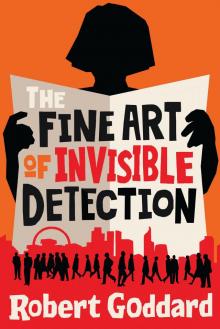 The Fine Art of Invisible Detection
The Fine Art of Invisible Detection One False Move
One False Move Panic Room
Panic Room Beyond Recall
Beyond Recall Out of the Sun
Out of the Sun In Pale Battalions - Retail
In Pale Battalions - Retail Painting The Darkness - Retail
Painting The Darkness - Retail The Corners of the Globe
The Corners of the Globe Name To a Face
Name To a Face Closed Circle
Closed Circle Caught In the Light
Caught In the Light Into the Blue
Into the Blue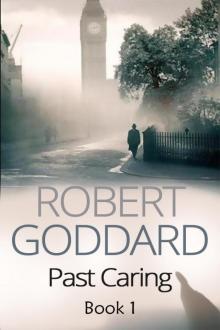 Past Caring - Retail
Past Caring - Retail Past Caring
Past Caring Hand In Glove - Retail
Hand In Glove - Retail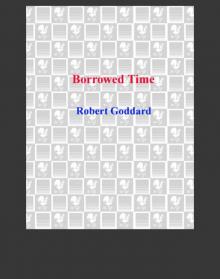 Borrowed Time
Borrowed Time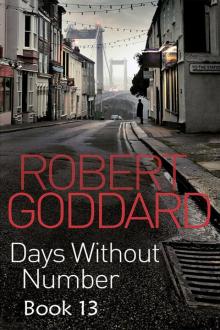 Days Without Number
Days Without Number James Maxted 03 The Ends of the Earth
James Maxted 03 The Ends of the Earth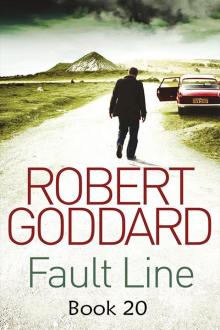 Fault Line - Retail
Fault Line - Retail Play to the End
Play to the End Sea Change
Sea Change Never Go Back
Never Go Back Take No Farewell - Retail
Take No Farewell - Retail Blood Count
Blood Count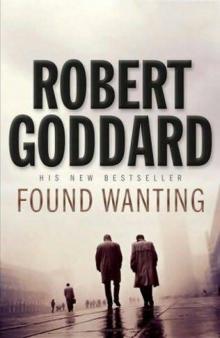 Found Wanting
Found Wanting Sight Unseen
Sight Unseen Hand in Glove
Hand in Glove The Ways of the World
The Ways of the World